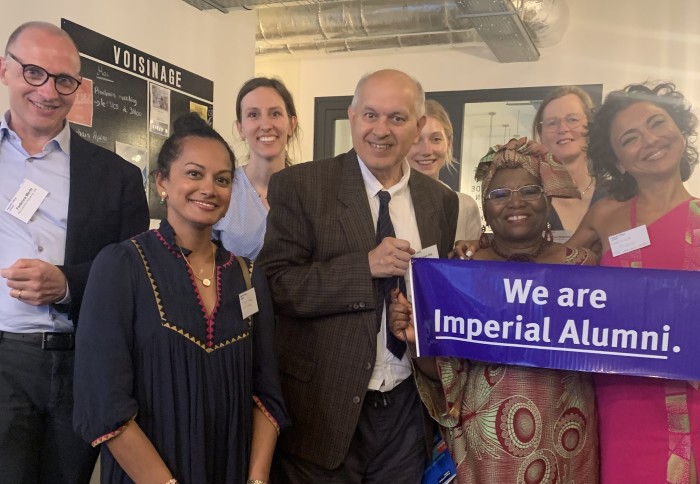Imperial alumni and experts focus on solving global development challenges

Imperial alumni and experts focused on ways to tackle major global challenges faced by developing countries, at an event in Geneva.
Academics from Imperial's Global Development Hub joined alumni to discuss the College's work in Least Developed Countries (LDCs) and Lower Middle Income Countries (LMICs).
The Hub brings together Imperial’s community to maximise the global impact of the College's world-leading research, education and innovation, engage with the United Nations Sustainable Agenda 2030, and work with some of the most vulnerable and marginalised in societies where multiple global challenges are acutely concentrated.
Imperial alumni based in Geneva met with leaders from the Hub to explore ways to support its work.
Inspiring alumni

Switzerland is home to almost 1,500 Imperial alumni, many of which are based in Geneva, working in global development at agencies such as the United Nations and other NGOs.
One of those is Ambassador Yvette Stevens, who was Sierra Leone’s first Permanent Representative to the UN in Geneva. Yvette is currently Executive in Residence at the Geneva Center for Security Policy.
Other alumni working in the region include Marta Tufet, Head of Policy at Gavi, the Vaccine Alliance and Jasmeer Virdee, Trade Specialist at the International Trade Centre.
Global Development Hub

The Global Development Hub is the College’s Academic Strategy initiative focused on supporting the academic and student community to work with partners in LDCs and LMICs to co-create solutions to development challenges.
Co-Chairs of the Global Development Hub, Professor Michael Templeton and Professor Sarah Fidler led meetings and events in Geneva to gain insight from alumni and friends on how the Imperial academic community can build on the College's outstanding Research Excellence Framework (REF) Research Impact results to support both development partnerships and the work of international organisations in Geneva.
Imperial's delegation visited UNDP Geneva to discuss accelerating technology and science that can underpin development solutions.
A pilot is underway with the UNDP Accelerator Labs - the world’s fastest growing development innovation network - to place Imperial MSc students working on Water and Sanitation and Environmental Technology to do projects with UNDP Accelerator Labs in India and Indonesia.
The Imperial team also met with experts from the World Meteorological Organisation (WMO), the United Nations Environment Programme (UNEP) and World Health Organisation (WHO) to discuss solutions to some of the world's major challenges.
Academics also held a roundtable event with the Geneva Science and Diplomacy Anticipator (GESDA) focused on how anticipating impacts of future science trends for people, society and planet can inform development solutions today.
Meetings also took place with World Economic Forum (WEF) programme leads for health and climate, with a focus on water and sanitation technologies.
Professor David Nabarro, Co-Chair of the Institute of Global Health Innovation and Special Envoy on Covid-19 for the WHO, addressed colleagues from the Geneva community to underline the importance of science collaboration in building back better from Covid-19 and developing equitable programmes and platforms that move beyond the North-South divide.
Article text (excluding photos or graphics) © Imperial College London.
Photos and graphics subject to third party copyright used with permission or © Imperial College London.
Reporter
Stephen Johns
Communications Division